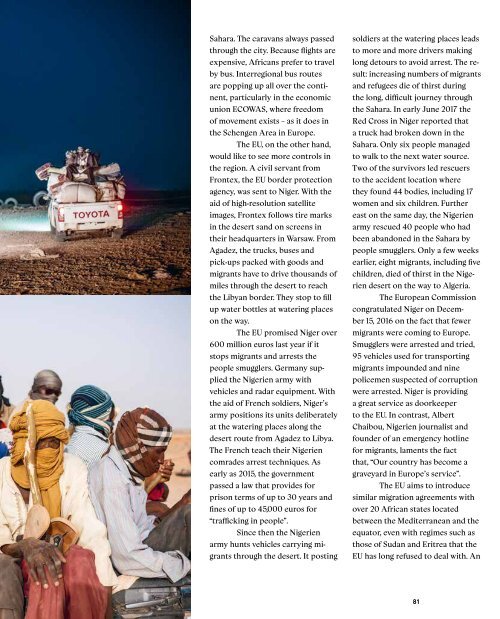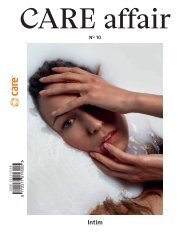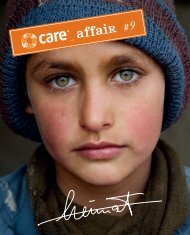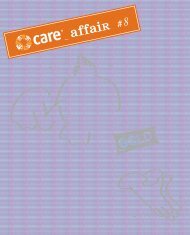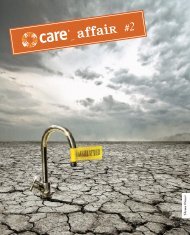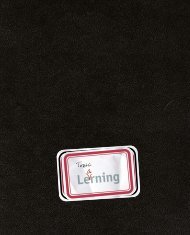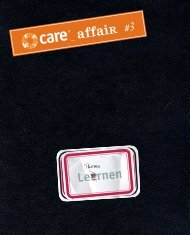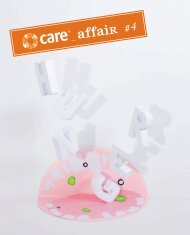CARE Affair #11 - Power
You also want an ePaper? Increase the reach of your titles
YUMPU automatically turns print PDFs into web optimized ePapers that Google loves.
Sahara. The caravans always passed<br />
through the city. Because flights are<br />
expensive, Africans prefer to travel<br />
by bus. Interregional bus routes<br />
are popping up all over the continent,<br />
particularly in the economic<br />
union ECOWAS, where freedom<br />
of movement exists – as it does in<br />
the Schengen Area in Europe.<br />
The EU, on the other hand,<br />
would like to see more controls in<br />
the region. A civil servant from<br />
Frontex, the EU border protection<br />
agency, was sent to Niger. With the<br />
aid of high-resolution satellite<br />
images, Frontex follows tire marks<br />
in the desert sand on screens in<br />
their headquarters in Warsaw. From<br />
Agadez, the trucks, buses and<br />
pick-ups packed with goods and<br />
migrants have to drive thousands of<br />
miles through the desert to reach<br />
the Libyan border. They stop to fill<br />
up water bottles at watering places<br />
on the way.<br />
The EU promised Niger over<br />
600 million euros last year if it<br />
stops migrants and arrests the<br />
people smugglers. Germany supplied<br />
the Nigerien army with<br />
vehicles and radar equipment. With<br />
the aid of French soldiers, Niger’s<br />
army positions its units deliberately<br />
at the watering places along the<br />
desert route from Agadez to Libya.<br />
The French teach their Nigerien<br />
comrades arrest techniques. As<br />
early as 2015, the government<br />
passed a law that provides for<br />
prison terms of up to 30 years and<br />
fines of up to 45,000 euros for<br />
“trafficking in people”.<br />
Since then the Nigerien<br />
army hunts vehicles carrying migrants<br />
through the desert. It posting<br />
soldiers at the watering places leads<br />
to more and more drivers making<br />
long detours to avoid arrest. The result:<br />
increasing numbers of migrants<br />
and refugees die of thirst during<br />
the long, difficult journey through<br />
the Sahara. In early June 2017 the<br />
Red Cross in Niger reported that<br />
a truck had broken down in the<br />
Sahara. Only six people managed<br />
to walk to the next water source.<br />
Two of the survivors led rescuers<br />
to the accident location where<br />
they found 44 bodies, including 17<br />
women and six children. Further<br />
east on the same day, the Nigerien<br />
army rescued 40 people who had<br />
been abandoned in the Sahara by<br />
people smugglers. Only a few weeks<br />
earlier, eight migrants, including five<br />
children, died of thirst in the Nigerien<br />
desert on the way to Algeria.<br />
The European Commission<br />
congratulated Niger on December<br />
15, 2016 on the fact that fewer<br />
migrants were coming to Europe.<br />
Smugglers were arrested and tried,<br />
95 vehicles used for transporting<br />
migrants impounded and nine<br />
policemen suspected of corruption<br />
were arrested. Niger is providing<br />
a great service as doorkeeper<br />
to the EU. In contrast, Albert<br />
Chaibou, Nigerien journalist and<br />
founder of an emergency hotline<br />
for migrants, laments the fact<br />
that, “Our country has become a<br />
graveyard in Europe’s service”.<br />
The EU aims to introduce<br />
similar migration agreements with<br />
over 20 African states located<br />
between the Mediterranean and the<br />
equator, even with regimes such as<br />
those of Sudan and Eritrea that the<br />
EU has long refused to deal with. An<br />
Gründergeist in Somaliland<br />
81


